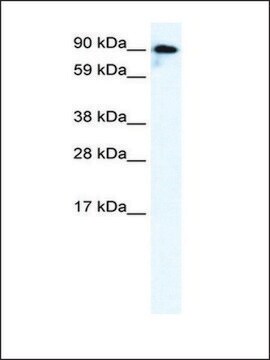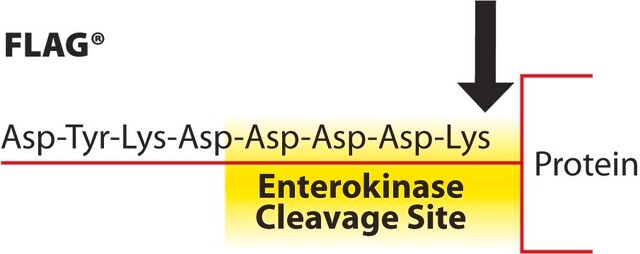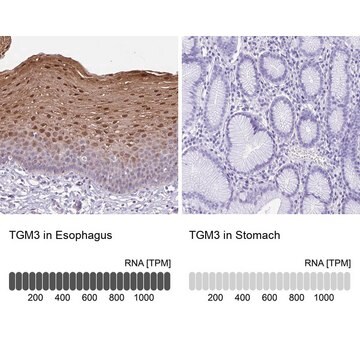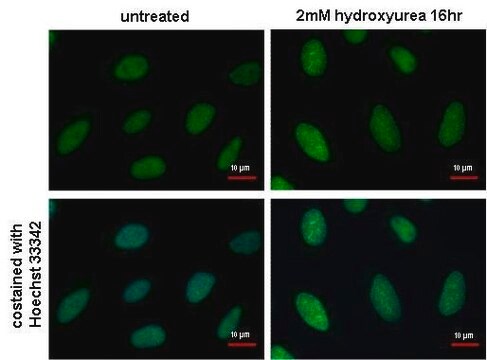HPA014623
Anti-GRIK2 antibody produced in rabbit
Prestige Antibodies® Powered by Atlas Antibodies, affinity isolated antibody, buffered aqueous glycerol solution
Sinonimo/i:
Anti-EAA4, Anti-Excitatory amino acid receptor 4, Anti-GluR-6, Anti-GluR6, Anti-Glutamate receptor 6, Anti-Glutamate receptor, ionotropic kainate 2 precursor
About This Item
immunohistochemistry: 1:1000-1:2500
Prodotti consigliati
Origine biologica
rabbit
Livello qualitativo
Coniugato
unconjugated
Forma dell’anticorpo
affinity isolated antibody
Tipo di anticorpo
primary antibodies
Clone
polyclonal
Nome Commerciale
Prestige Antibodies® Powered by Atlas Antibodies
Stato
buffered aqueous glycerol solution
Reattività contro le specie
human, mouse, rat
tecniche
immunoblotting: 0.04-0.4 μg/mL
immunohistochemistry: 1:1000-1:2500
Sequenza immunogenica
ITFNKTNGLRTDFDLDVISLKEEGLEKIGTWDPASGLNMTESQKGKPANITDSLSNRSLIVTTILEEPYVLFKKSDKPLYGNDRFEGYCIDLL
N° accesso UniProt
Condizioni di spedizione
wet ice
Temperatura di conservazione
−20°C
modifica post-traduzionali bersaglio
unmodified
Informazioni sul gene
human ... GRIK2(2898)
Descrizione generale
Immunogeno
Applicazioni
The Human Protein Atlas project can be subdivided into three efforts: Human Tissue Atlas, Cancer Atlas, and Human Cell Atlas. The antibodies that have been generated in support of the Tissue and Cancer Atlas projects have been tested by immunohistochemistry against hundreds of normal and disease tissues and through the recent efforts of the Human Cell Atlas project, many have been characterized by immunofluorescence to map the human proteome not only at the tissue level but now at the subcellular level. These images and the collection of this vast data set can be viewed on the Human Protein Atlas (HPA) site by clicking on the Image Gallery link. We also provide Prestige Antibodies® protocols and other useful information.
Azioni biochim/fisiol
Caratteristiche e vantaggi
Every Prestige Antibody is tested in the following ways:
- IHC tissue array of 44 normal human tissues and 20 of the most common cancer type tissues.
- Protein array of 364 human recombinant protein fragments.
Linkage
Stato fisico
Note legali
Esclusione di responsabilità
Non trovi il prodotto giusto?
Prova il nostro Motore di ricerca dei prodotti.
Codice della classe di stoccaggio
10 - Combustible liquids
Classe di pericolosità dell'acqua (WGK)
WGK 1
Punto d’infiammabilità (°F)
Not applicable
Punto d’infiammabilità (°C)
Not applicable
Dispositivi di protezione individuale
Eyeshields, Gloves, multi-purpose combination respirator cartridge (US)
Scegli una delle versioni più recenti:
Certificati d'analisi (COA)
Non trovi la versione di tuo interesse?
Se hai bisogno di una versione specifica, puoi cercare il certificato tramite il numero di lotto.
Possiedi già questo prodotto?
I documenti relativi ai prodotti acquistati recentemente sono disponibili nell’Archivio dei documenti.
Il team dei nostri ricercatori vanta grande esperienza in tutte le aree della ricerca quali Life Science, scienza dei materiali, sintesi chimica, cromatografia, discipline analitiche, ecc..
Contatta l'Assistenza Tecnica.








